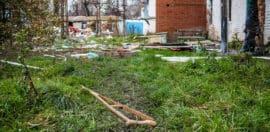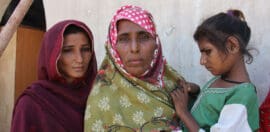Pacific funding boost to come at a cost

7 October 2020 at 7:15 pm
Australia’s foreign aid budget does not go far enough to address the threat to global progress on poverty that the pandemic poses, advocates say.
A $305 million boost to help Pacific Island countries and Timor-Leste deal with the impacts of COVID-19 has been welcomed by foreign aid groups, but they say it should not come at the cost of helping other countries.
The Morrison government announced the one-off funding package – to be delivered over the next two years – in Tuesday’s budget, but it will not technically count as foreign aid.
This leaves Australia’s Overseas Development Assistance (ODA) contribution at $4 billion, which is just 0.21 per cent of the country’s Gross National Income, the smallest it’s ever been.
Paul Ronalds, the CEO of Save the Children Australia, told Pro Bono News that while he welcomed the temporary economic support for the Pacific and Timor Leste, anyone in the region looking to Australia for leadership would be disappointed by such a small aid budget.
“We’re facing collectively as a planet, the world’s largest ever humanitarian crisis, and I think the reality of our foreign aid budget is that it’s simply insufficient for the strategic tasks that we want to perform,” Ronalds said.
There is also concern that the funding will come at the cost of cuts to other aid programs in South and West Asia, Afghanistan, African and the World Food Programme.
Oxfam Australia CEO, Lyn Morgain, said the announcements were light on detail.
“It is unclear whether this additional funding has been made up by cuts and reductions to other life-saving programs in the Middle East, Africa or South and West Asia,” she said.
Oxfam Australia has estimated almost 240 million people in East Asia and the Pacific, and close to 130 million people in South Asia will be pushed into poverty by the impacts of COVID. Morgain said these impacts would last years, if not decades.
“With growing global uncertainty as a result of COVID-19, we need stronger strategic relationships now more than ever, and greater, long-term permanent investment in the development budget would have seen Australia recognised as a practical partner of choice that sets us apart from other powers, in the region and beyond.”
Marc Purcell, CEO of the Australian Council For International Development (ACFID), echoed these sentiments, saying that Australia’s recovery from the pandemic was linked to Asia.
“We are looking to the government to continue on this path, lock-in these temporary increases and expand our development cooperation in Asia as part of the May 2021 budget,” Purcell said.
“We are deeply disappointed by the declines in Afghanistan, Bangladesh, Sri Lanka and Pakistan, as well as reductions in some global humanitarian partnerships and disability programs.”
But this first budget announcement may be a sign of things to come.
An article published on Wednesday by The Sydney Morning Herald and The Age revealed DFAT is still working on a proposal to increase assistance for countries in Asia.
“This may be addressed in the leadup to next year’s budget, which is only seven months away, according to government sources,” the article said.
A spokesperson for ACFID told Pro Bono News that they believed there would be additional investments made to tackle COVID-19.
“I think we are going to see more on this line, we are hopeful that this is the beginning of a better trajectory,” they said.
Humanitarian refugee program slashed
It didn’t make Frydenberg’s budget speech, but Australia will also cut its humanitarian refugee intake from 18,750 to 13,750, saving the government around $1 billion.
Ronalds said that it was a “particularly disappointing cut”.
“We as a planet have 79.5 million people displaced, the highest number since World War Two,” he said.
“It’s absolutely critical that countries like Australia that do have the capacity, act as good global citizens and do our fair share. And quite frankly, the reduction in the number of refugee places that we’re offering is not consistent with us doing our fair share.”
He said that at a time when the country was looking to grow its economy, shutting out refugees was a lost opportunity.
“We should be welcoming them [refugees] with open arms and instead, at a time when we need more entrepreneurial talent, when we need people willing to to work hard and grow the economy, we’re reducing the intake of the very people that would help us do that,” Ronalds said.
Our 2020 budget coverage is brought to you by Bendigo Bank







